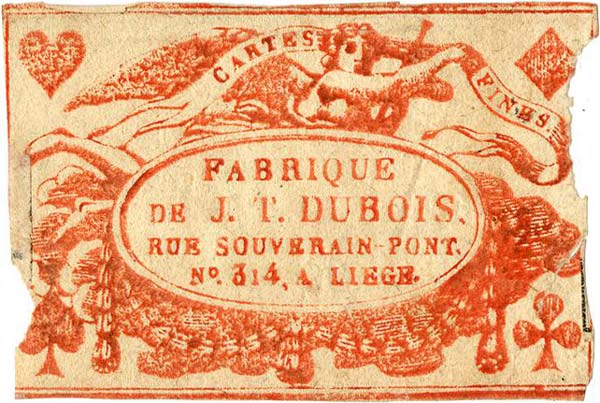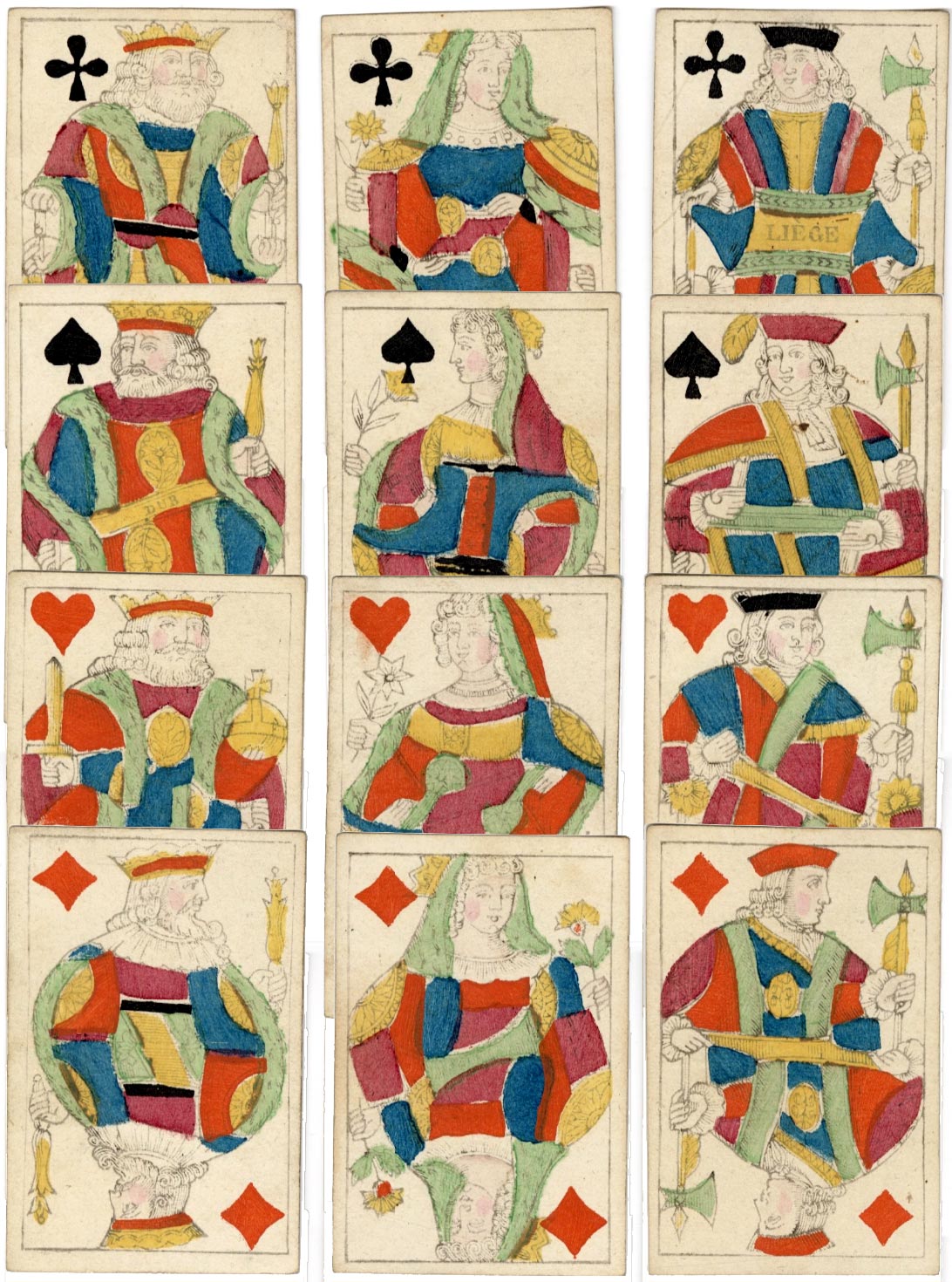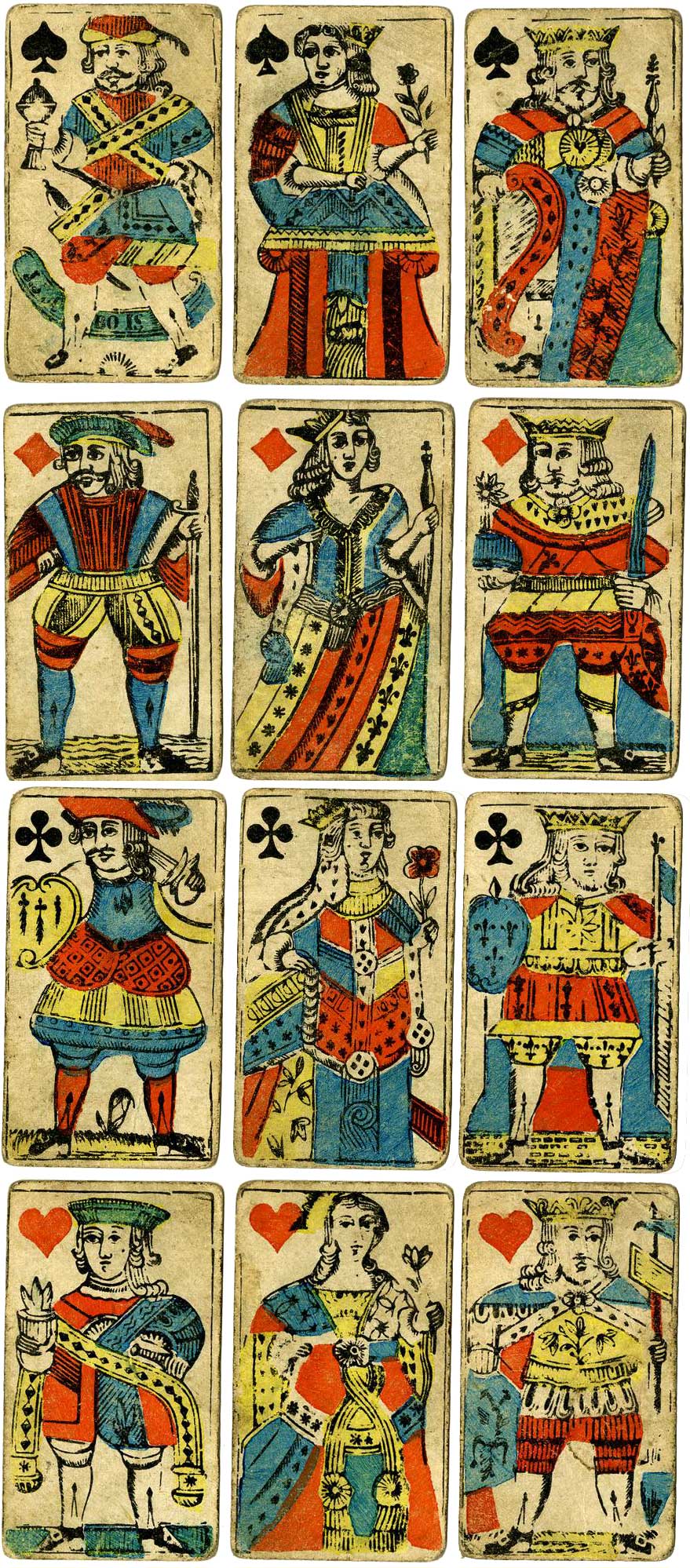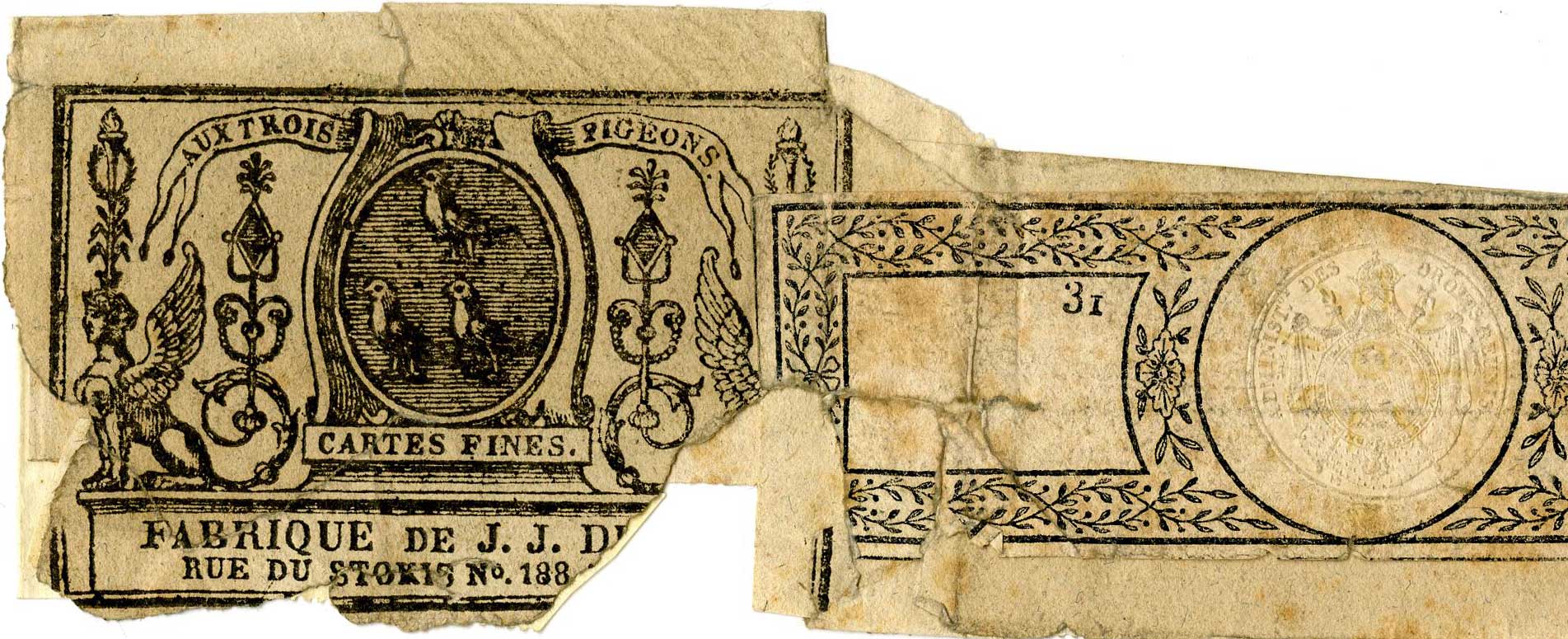Dubois
Dubois card makers from Liège in the Walloon Region of Belgium.

Above: J T Dubois operated at Rue Souverain-Pont No. 314, Liege. Detail from a wrapper, c.1800-1825. © The Trustees of the British Museum online here►
Cardmakers by the name of J.B, J.T and J.J Dubois of Liège are known from the late-18th ’til mid-19th centuries.
J B Dubois had a workshop behind the Maison de Ville
J J Dubois was established at Haute-Sauvernière 352, or Rue de Stokis 188
J T Dubois operated at Rue Souverain-Pont No. 314.
They produced standard Belgian, Liège and Paris patterns, also Animal Tarots, children’s cards, a fantasy design with decorative aces and Gatteaux's Empire cards, in several qualities and sizes. Their businesses were eventually taken over by G. Gluck, also of Liège.
Paris pattern - J.T Dubois

Above: double-ended Paris pattern piquet deck manufactured by J.T Dubois, Liège, c.1810-1820. Named courts. Stencil-coloured woodcut prints. The king of spades has the legend "J T DUBOIS" in the middle and the jack of clubs "A LIEGE". From the National Museum of the Playing Card collection, online here►
• Gatteaux's Empire cards published by J T Dubois, British Museum online collection►
• 18th Century Animal Tarot published by J B Dubois, British Museum online collection►
• 19th Century Animal Tarok published by J J Dubois, National Museum of the Playing Card online collection►
Belgian pattern

Above: Belgian pattern manufactured by Dubois, Liège, mid-19th century. Based on the French Paris pattern, but unnamed courts and unconventional colour scheme. Stencil-coloured woodcut prints. The king of spades has the letters "DUB" in the middle and the jack of clubs "LIEGE".
Liège pattern - J.J Dubois

Above: Liège pattern manufactured by J.J Dubois. Complete piquet pack of 32 playing-cards, hand-coloured woodcut, backs printed with a small black pattern, 19th century. The king of hearts holds a shield charged with an eagle, and that held by the king of clubs is charged with the fleur-de-lis of France. The king of spades holds a harp. The inscription on the knave of spades is "J. J. Dubois". © The Trustees of the British Museum online here►

Above: part of wrapper by J.J Dubois bearing the device "Aux trois Pigeons" and showing address at Rue de Stokis 188. © The Trustees of the British Museum online here►
REFERENCES
Cremers, Filip: Kaartenmakers in Wallonië - Cartiers en Wallonie, Nationaal Museum van de Speelkaart, Turnhout, 1994
Gatteaux's Empire cards published by J T Dubois, British Museum online collection►
18th Century Animal Tarot published by J B Dubois, British Museum online collection►
19th Century Animal Tarok published by J J Dubois, National Museum of the Playing Card online collection►

By Simon Wintle
Member since February 01, 1996
I am the founder of The World of Playing Cards (est. 1996), a website dedicated to the history, artistry and cultural significance of playing cards and tarot. Over the years I have researched various areas of the subject, acquired and traded collections and contributed as a committee member of the IPCS and graphics editor of The Playing-Card journal. Having lived in Chile, England, Wales, and now Spain, these experiences have shaped my work and passion for playing cards. Amongst my achievements is producing a limited-edition replica of a 17th-century English pack using woodblocks and stencils—a labour of love. Today, the World of Playing Cards is a global collaborative project, with my son Adam serving as the technical driving force behind its development. His innovative efforts have helped shape the site into the thriving hub it is today. You are warmly invited to become a contributor and share your enthusiasm.
Related Articles

French Revolutionary cards by Pinaut
Seven cards from a French Revolutionary pack by Pinaut featuring characters from classical antiquity...

An Anonymous Belgian Transformation Pack
Anonymous Belgian transformation pack borrowing many images from earlier designs by Braun & Schneide...

Bertschinger y Codina - Cartes Françaises
French ‘Paris’ pattern made by Bertschinger y Codina, Barcelona, c.1850.

Blake et Mortimer – La Marque Jaune
Blake and Mortimer comic strip characters created by Edgar P. Jacobs.

Santo Mexico playing cards
Santo Mexico playing cards designed by Cédric Volon with Mexico-associated symbols.

Gallia Belgica playing cards
Gallia Belgica playing cards by Cédric Volon presenting a view of Belgian culture and folklore.

Historical Characters
Double-ended deck with historical characters and jacks as jesters by Daveluy, c.1850.

Mademoiselle Lenormand
XIX century ‘Mlle Lenormand’ cartomancy deck by Daveluy, Bruges.

Rouen Pattern - Portrait Rouennais
An attractive XV century French-suited design from Rouen became the standard English & Anglo-America...

Redrawn French pattern (Héron)
Redrawn French pattern retaining traditional elements.

Printing Presses
Antique printing presses from the Turnhout Playing Card Museum collection.

Ganjifa - Playing Cards from India
Indian playing cards, known as Ganjifa, feature intricate designs with twelve suits and are traditio...

The Henry Hart Puzzle
Explore the intricate history and unique design variations of Henry Hart's playing cards, tracing th...

Sevilla 1647 reproduction
Facsimile of Spanish-suited pack produced in Sevilla, Spain, 1647.

Why our playing-cards look the way they do
Analysis of early playing card designs: origins, suit differences, standardization, technological ad...

Introduction to Collecting Themes
Playing cards can be broadly categorised into standard and non-standard designs, with collectors app...
Most Popular
Our top articles from the past 28 days

